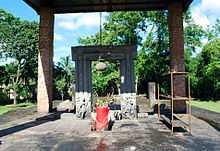Da Parbatia
From Wikipedia, the free encyclopedia

Da-Parbatia temple
Da Parbatia (Assamese: দ-পৰ্বতীয়া) is a 6th-century architectural site of a stone-built Hindu temple.[1] On the ruins of this structure, a brick Siva temple had been built during the Ahom period, which collapsed in the 1897 Assam earthquake, revealing the door frame of the older structure. This site is protected under the auspices of the Archaeological Survey of India.
The door frame stands in front of a large block of stone with a square cavity that held the original lingam. The two jambs have Ganga and Yamuna, two female deities, holding garlands in their hands.
Location
It is located on the outskirts of Tezpur in Assam, India. Aerial view of this site is available through wikimapia.
Notes
- ↑ (Banerji 1925, p. 98)
References
- Banerji, R D (1925), "Dah Parbatiya", Annual Report 1924-25, Archeological Survey of India, pp. 98–99, retrieved March 2, 2013
External references
- Da Parbatia, Maha bhairav temple Photos
- Temples & Monuments in Assam
- Tourist sites around Tezpur
- Excavation records of ASI
- An old photo of Da Parbatia by Dhani Bora
This article is issued from Wikipedia. The text is available under the Creative Commons Attribution/Share Alike; additional terms may apply for the media files.